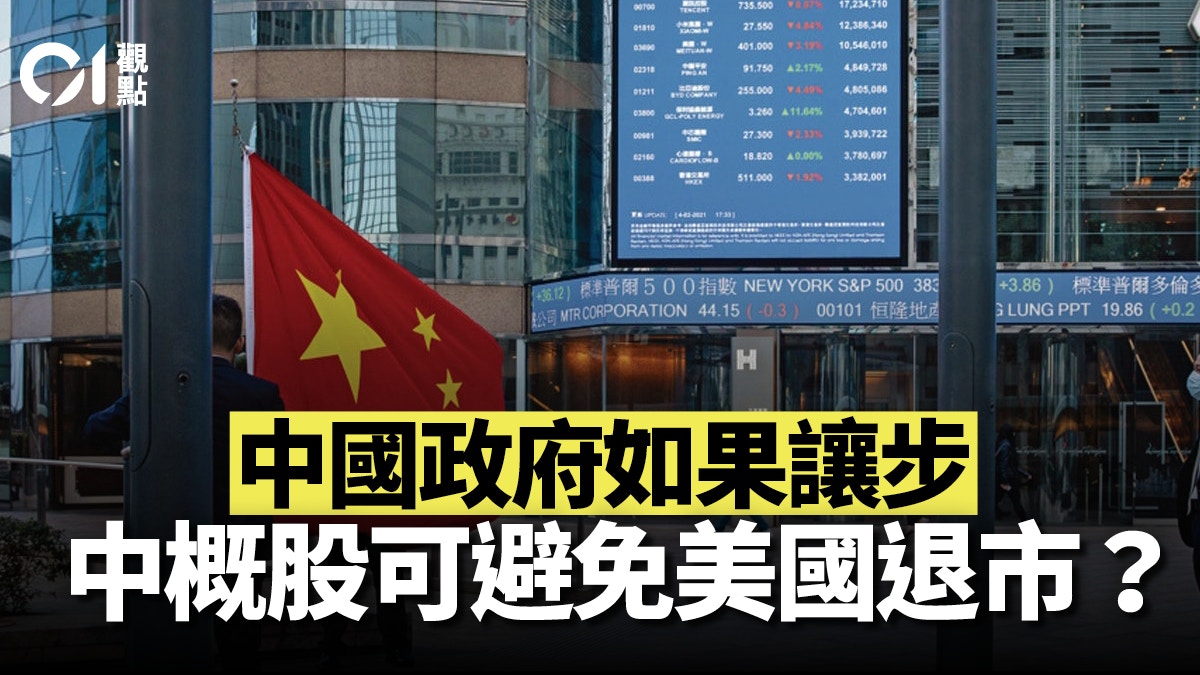Last month, the U.S. Securities and Exchange Commission (SEC) released a list of scheduled delistings of Chinese companies listed in the U.S., raising market concerns that Chinese concept stocks are facing a crisis of collective delisting.
The Chinese government immediately stated that the two sides were in communication on the audit issue, and last weekend it proposed to amend the regulatory requirements to make concessions on the audit issue, sending a signal to the market that it might avoid delisting.
However, there are still many variables in related issues. For Chinese companies listed overseas, returning to Hong Kong as soon as possible for secondary listing or dual primary listing is still an important step to avoid delisting risks.
The delisting risk of Chinese concept stocks stems from the "Foreign Company Accountability Act" passed by the US Congress in 2020.
The law stipulates that if a foreign company listed in the United States fails to submit audit papers to the Public Company Accounting Oversight Board (PCAOB) for three consecutive years, it will be forced to delist.
With the law taking effect from 2021, Chinese companies listed in the United States will face delisting risks after announcing their 2023 full-year results in early 2024 at the earliest.
The U.S. Securities and Exchange Commission (SEC) included BeiGene and other five U.S.-listed Chinese companies on the list of delisting risks under the "Foreign Company Accountability Act", and Chinese concept stocks suffered a heavy setback.
Returning to Hong Kong for listing to manage delisting risks
The Chinese government emphasized last month that it is actively communicating with the United States on auditing issues, and the China Securities Regulatory Commission recently proposed a draft amendment to the regulation of overseas listed companies. Inspections should be conducted mainly by Chinese regulators, or rely on the results of inspections by Chinese regulators.
However, U.S. authorities are less optimistic about the outcome. The PCAOB said in a public statement at the end of last month that even “full access to audit documents” for sensitive industries is “non-negotiable.” It is still questionable whether Chinese companies’ concessions are sufficient.
In any case, on the one hand, the results of the audit issue are not yet known. On the other hand, with the increasingly obvious trend of the game between China and the United States, the United States actively uses its dominant position in the financial market to interfere with China's development. In the future, other requirements will be imposed on Chinese companies listed in the United States. It is not impossible, and a new delisting crisis may occur at that time.
Therefore, for those Chinese companies that are only listed in the United States, returning to Hong Kong for a secondary listing or a secondary primary listing is really a "groundwork" for preventing risks.
At least in case of forcible delisting by the United States, it will not be completely delisted.
The transparency of the system of the Hong Kong Stock Exchange is one of the reasons for attracting Chinese concept stocks.
(File photo/Photo by Jiang Zhiqian)
Hong Kong should plan well
The Hong Kong government has always said in the past that it is ready to welcome the return of Chinese concept stocks. The "Budget" released in February this year also mentioned that the government is ready to attract high-quality Chinese concept stocks to list in Hong Kong.
However, when Legislative Council member Lin Zhiyuan asked about the government's specific preparations for the return of Chinese stocks and whether it had a timetable, the Secretary for Financial Services and the Treasury Xu Zhengyu only mentioned in the written reply on Wednesday (6th) that the government has Hong Kong's listing rules are well prepared, and it seems that there is no active contact with the mainland authorities and these US-listed companies, and no specific timetable has been mentioned.
Under normal circumstances, whether or when a company is listed in Hong Kong is a commercial decision.
However, the risk of delisting is increasing, and the situation cannot be compared.
If the Chinese concept stocks really return to Hong Kong for listing in a rush because of the risk of delisting, then the liquidity may not be able to cope with the collective return of so many companies to Hong Kong to raise funds in the short term.
Although the government's reply mentioned that 19 companies, which account for 70% of the market value of Chinese concept stocks listed in the United States, have completed their listing in Hong Kong, it is estimated that the market value of Chinese concept stocks listed in the United States was still as high as US$1.19 trillion on March 25. , that is, the market value of the Chinese concept stocks that have not returned to Hong Kong for listing is still as high as US$360 billion, which is not an item that can be easily digested.
It is necessary for the government to do a good job in the timetable management of the return listing.
Even if the specific timetable is not available to the public, the Hong Kong Stock Exchange, the Securities Regulatory Commission and the government should actively contact these Chinese companies, or communicate with the mainland authorities to understand their willingness to return and make communication arrangements as soon as possible. and how difficult it is to understand them.
Otherwise, as the beginning of 2024 gets closer and closer, unforeseen problems will occur, such as the chance of crowding the market, and it is not always possible to wait until the problem occurs before trying to fix it.
Seize the opportunity of China's return to consolidate its status as a financial center, the central government adjusts policies to reflect the important of financial stability, and delays the listing of SenseTime to do well in Hong Kong's financial market under US sanctions. Use fintech to promote Hong Kong's industrial transformation and upgrading|Yu Pinhai





/cloudfront-eu-central-1.images.arcpublishing.com/prisa/C5YJHHEROCYBVALE4P32TADYVA.jpg)

